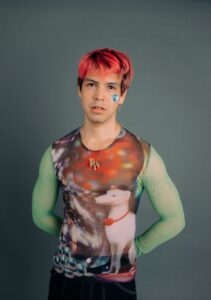To be sucked into the universe of Julio Torres is to find oneself surrounded by worlds teetering on the cusp of the absurd and the real. Each world is adorned with whimsical props, surreal characters, and playful humor. But Torres’s colorful worldbuilding always belies something deeper — a genuine curiosity and exploration of what makes humans tick.

Torres’s debut feature film, Problemista, is no exception. It will be screened at the Provincetown International Film Festival at 7:30 on Saturday, June 17 at town hall. Torres will also be honored with PIFF’s New Wave award alongside comedian and actress Megan Stalter.
Problemista begins with Alejandro, an aspiring toymaker from El Salvador hoping to make it in New York City. Naïve and somewhat quixotic, he is racing against the clock to find a sponsor for a work visa. That’s when he meets the erratic artworld outsider Elizabeth (played by the ever-hard-to-define Tilda Swinton), who is clearly not the easy way out for him.
Coupled with the burden of the U.S. immigration system’s impossible bureaucracy, in which Alejandro finds himself constantly crawling out from under mountains of paperwork, Torres’s tonal aesthetic for the film can best be described as magical realism. Moments of otherworldly phenomena, like visa-hopefuls disappearing after having their applications denied, tessellate a portrait of the red tape of American life.
For Torres, braiding together the surreal with the real felt like the natural way to represent the visa process. “In my work, I aspire to show things as they feel rather than as they are,” Torres says. “So much of the immigration process is very frustrating paperwork that is riddled with emotion. The fantastical elements in the movie are grounded in what it feels like to navigate those things.”

The film is semi-autobiographical for Torres, who emigrated to New York from El Salvador for college, after which he scrambled to find a sponsor for a work visa to stay in the U.S. But he hopes the film has much broader reach.
“It’s a film about people feeling dehumanized by a process, whether that be immigration, or being in debt, or navigating an insurance company,” he says. “Our lives now are often dictated by what we see on our phones or our email, and I think we are catching up on how to portray the emotionality of that, which is something I’m interested in figuring out.”
Torres met a couple of Elizabeths during his own process of securing visas, he says. Swinton’s character is “an amalgamation of different New Yorkers I encountered during that journey, and ultimately learning from those experiences,” he says. Early in the film, Elizabeth tells Alejandro that she will sponsor him if he helps curate an art exhibit by her husband (played by rapper RZA). This is only the first curveball she throws at Alejandro. “Navigating her emotionality is the biggest hoop — the idea of someone who makes things harder than they need to be,” Torres says.
Alejandro often gets in his own way, Torres says. It’s an anti-hero trope with a classic hero’s journey arc of navigating the trials of a labyrinthine system. Ultimately, Alejandro is always called back to his own sirens, Torres says. “It’s a movie about problems, people who cause problems, who are attracted to problems,” he says.
Hence, the film’s name. “Everyone in this movie is a problemista,” Torres says. “I even had background actors in the movie portraying some kind of problem they are themselves going through. That is the New York I have experienced — a place filled with many people with problems.”
Torres did not know this would become the movie’s main motif when he began outlining the story. “I first started writing the movie as a story about perseverance and about overcoming obstacles,” Torres says. “Then it blossomed into a movie about thriving within problems. It’s not a down-on-his-luck tale — it’s a movie about having a love affair with your antagonists.”
Torres shies away from the “American Dream” story as it has been formulated in dominant narratives. “I question the notion of the American Dream,” he says. “It can be very easily deployed to describe this movie, but I hope the takeaway isn’t to try really hard and things will work out. It’s much more a criticism about why these processes are so hard in the first place.”
Torres’s directorial debut is much more personal than his previous work, he says. Torres wrote for Saturday Night Live for five years. His solo show, “My Favorite Shapes,” premiered at the Edinburgh Fringe Festival and later became an hour-long comedy special for HBO. Torres also wrote and starred in the bilingual HBO comedy Los Espookys alongside Fred Armisen and Ana Fabrega.
Despite its earnestness, Torres’s Problemista retains the playfulness that gave rise to the fame and adulation of the Julio-sphere. “When you are a kid and you’re playing with toys and coming up with your own little stories, you’re not thinking ‘Are people going to like this?’ ” Torres says. “It’s about being freed from the expectation of being understood.”
Editor’s note: An earlier version of this article, published in print on June 15, incorrectly credited the photos to Obscured Pictures instead of A24.



